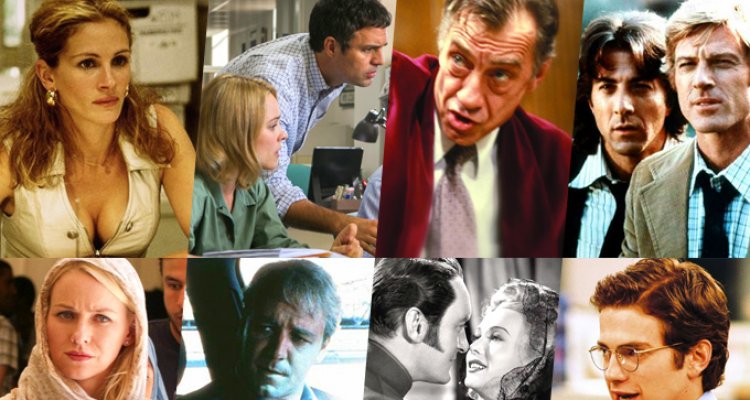
Oscar season heats up significantly this week with the release of “Spotlight.” The presumptive front-runner in the awards race for many, Thomas McCarthy’s film starring Michael Keaton, Mark Ruffalo, Rachel McAdams, Liev Schreiber, Stanley Tucci, Billy Crudup has been picking up glowing reviews (read ours here) since its Venice Film Festival premiere, telling the gripping story of attempts by reporters for the Boston Globe to uncover the cover-up of child molestation by Catholic priests in the city.
McCarthy’s film fits into a long history of Hollywood movies tackling real-life scandal, from horrifying institutional corruption of the kind shown here to scurrilous sex scandals involving public figures. With the movie hitting theaters on Friday, we’ve picked out thirteen of the best films based on real-life scandals. Take a look below, and let us know any we miss that you like in the comments.

“All The President’s Men” (1976)
Alan J. Pakula‘s investigative masterpiece is a pinnacle of dogged journalism in cinema. Every film depicting journalists at work that came out after “All The President’s Men” —especially those concentrated on a roll-up-your-sleeves ethic, sleepless nights, and over-caffeinated nerves found in newsrooms— works in the eternal shadow cast by this classic bastion of determinism to report the truth. Only a few years after the Watergate debacle shamed Richard Nixon into resignation and opened a nation’s eyes to an administration that trampled constitutional rights, William Goldman adapted Carl Bernstein and Bob Woodward‘s eponymous book into an Oscar-winning sensation of cutthroat dialogue and paranoid beats. Robert Redford and Dustin Hoffman iconically portray Woodward and Bernstein (endearingly nicknamed “Woodstein”) while every supporting character —from Hal Holbrook‘s parking-lot source “Deep Throat” to Jason Robard‘s grizzled editor Ben Bradlee— plays an absolutely vital role. Gordon Willis‘ cinematography beautifully accentuates shadows and illuminates the meticulously crafted design of the film. Running after leads, following up with sources and pulling out teeth just to get a single name is rarely as exciting as it is in “All The President’s Men.” The film is alarmingly prescient with respect to our contemporary culture of paranoia and government whistleblowing (this has to be Edward Snowden‘s favorite movie of all time, right?).

“The Cat’s Meow” (2001)
Until this year, “The Cat’s Meow” was Peter Bogdanovich’s last fiction feature, and marked a modest return to form for a director who’d had plenty of ups and downs over the years. Supposedly based on an anecdote told to him by his friend Orson Welles, the film sets out to solve the murder of Thomas Ince, a pioneering filmmaker who died after a weekend on the yacht of mogul William Randolph Hearst, with Charlie Chaplin, Hearst’s mistress Marion Davies, and gossip legend Louella Parsons among the other guests. Bogdanovich’s film suggests a sort of love triangle between Hearst (Edward Hermann), Davies (Kirsten Dunst) and Chaplin (Eddie Izzard), one which turns into murder and cover-up. It’s material that’s perfectly suited to Bogdanovich: he’s one of the great living experts on classic Hollywood, he can film the jazz age better than most, and is able to walk the line between farce and tragedy neatly. It’s in the latter regard that the film really shines: Dunst and Hermann, in particular, are excellent at bringing a level of pathos to the movie that lesser films would have botched, and it truly sell an unlikely romance. Not all the casting is as effective —both Jennifer Tilly as Parsons and Joanna Lumley as Elinor Glyn are having enormous fun, but Izzard is fundamentally miscast as Chaplin— but on the whole, it’s a pleasurable ensemble to spend time with, and a smart, if minor, Hollywood mystery.

“Eight Men Out” (1988)
Baseball is by far the most American of sports, and plenty of movies, from “The Pride Of The Yankees” through “Field Of Dreams” to “Moneyball,” have taken advantage of its almost Norman Rockwell-ish status. So when the game’s darker underbelly is revealed, it has a devastating effect —it’s difficult to imagine a better filmmaker to have tackled the sport’s most shameful moment than John Sayles. “Eight Men Out,” a rare foray into the mainstream for Sayles based on Elkot Asinof’s book, tells the story of “the Black Sox,” the 1919 Chicago White Sox team who were considered one of the greatest ever in the sport, but who ended up embroiled in a match-fixing scandal that forever tarnished its reputation and saw some great players banned from the sport. Sayles juggles the facts and a hefty ensemble (including then up-and-comers like John Cusack and Charlie Sheen doing some of their best work, and a wonderful David Strathairn as Eddie Cicotte) with clear-headed, unsentimental manner with a journalistic eye for detail. But he’s also a hugely compassionate filmmaker, and his Loachian sympathy for the working man (earlier demonstrated in “Matewan” and others) shines through by making a story that understands why the players did what they did, even if he implicitly shakes his head sadly that they did it.

